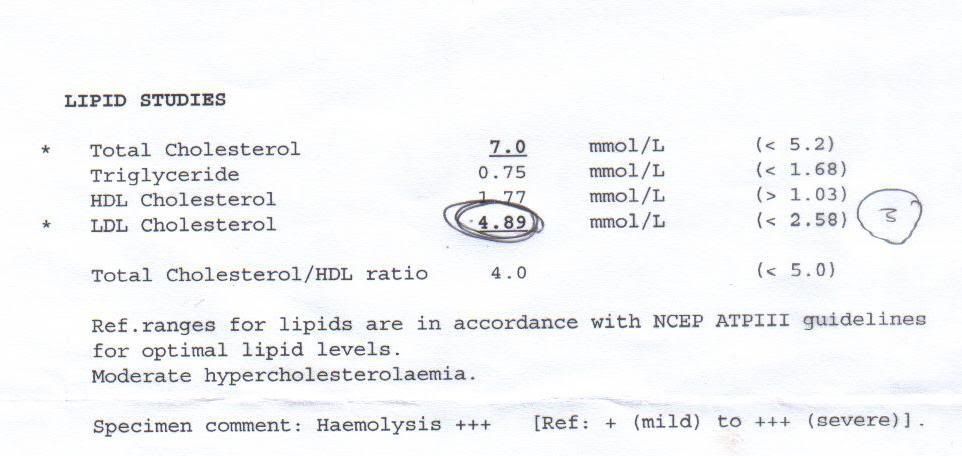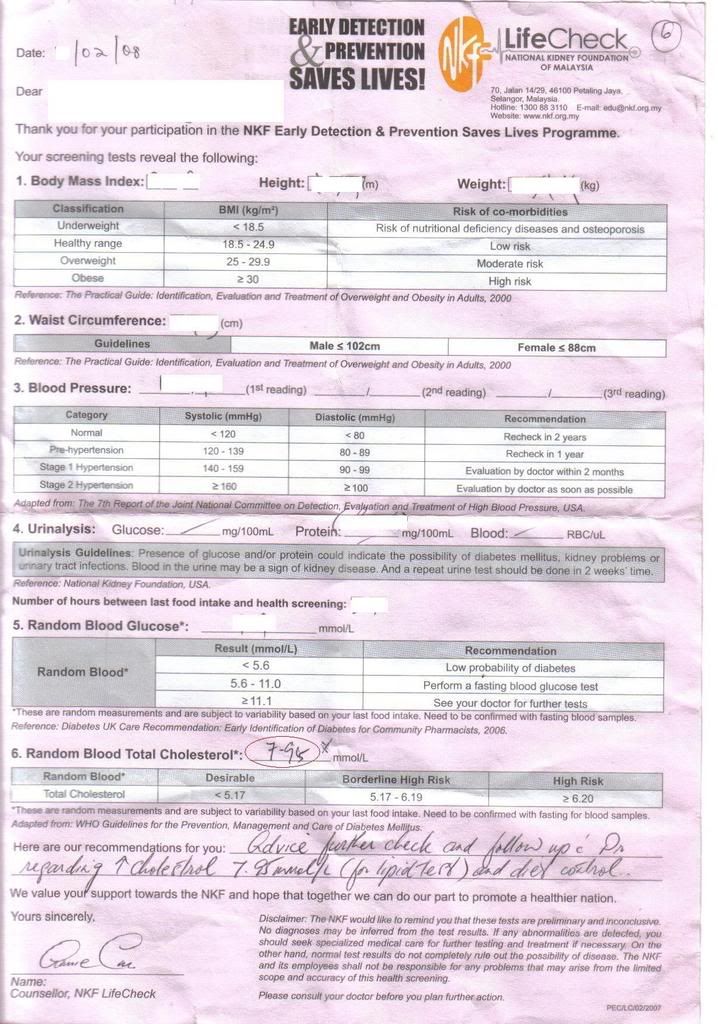Minggu lepas,
NKF(National Kidney Foundation of Malaysia) datang ke office utk check tekanan darah serta ujian darah utk kolestrol dan glucose. Disebabkan NKF ni badan kerajaan gak so bayaran utk buat ujian tu semua tak mahal hanya rm2. Itupun company yg bayar!! Memula tu excited gak sbb dah lama tak buat blood test dan tekanan darah ni. Tapi bila dapat hasil memang terkejut. Ukh..ukh..kolestrol ku tinggi!!Jangan tak caya jumlah kolestrol 7.95 mmol/L. Kiranya nak sedapkan hati mungkin kolestrol tinggi sebab pagi sebelum buat test ni ada amik sarapan yang mempunyai kolestrol tinggi iaitu kuning telur dan makanan bergoreng. Sepatutnya kalau nak test darah harus berpuasa. Untuk lebih puaskan hati so gi lah jumpa doktor kat klinik. Dierr suruh datang keesokan harinya dan start pukul 11mlm kena start puasa. Esok harinya pergi lah buat blood test kat klinik. Then doktor tu suruh datang minggu depan untuk amik result.
Result Dari NKF
Hari ni dah genap seminggu dan dah tiba masanya untuk pergi amik result kat doktor. Hati tu memang rasa berdebar2 mana taknya kolestrol tinggi ni tak leh buat main2. Kesan dierr pada jantung. Bila dah doktor bagitau result, memang terkedu. Doktor tu sendiri tak percaya. Dierr kata, " You're still young but your cholestrol very high. Your total cholestrol is 7.0 mmo/L and LDL cholestrol(kolestrol jahat) is 4.89 mmo/L. You not smoking and I don't know what have to do with you. Kemungkinan juga berkaitan dengan masalah penyakit usus yg itu hadapi sekarang ni" Lepas tu dierr suruh start amalkan diet dan exercise selalu. Nampaknya lepas ni tiap2 pagi sebelum pegi keja kena bersenam dulu dan kena ambil makanan yg kurang kolestrol. Doktor tu tak berani nak bagi ubat sebab usia kira muda lagi nak dapat kolestrol tinggi ni so kena jumpa dierr lagi 6 bulan akan datang utk test blood semula. Kebetulan 2 member opis pun buat test blood. Dua2 pun join the club sbb kolestrol tinggi.

Result Dari Klinik
Bila terbaca posting pasal kolestrol kat blog uncle
Zabs, dierr pun mengalami masalah yang sama dan mungkin sekarang kolestrol dierr dah rendah. Advice utk semua orang pergilah check kolestrol sebelum terlambat. Macam slogan kat bawah ni,
"Mencegah Itu Lebih Baik Dari Merawat"
Credit to NHLBI
What Is Cholesterol?
To understand high blood cholesterol (ko-LES-ter-ol), it is important to know more about cholesterol.
- Cholesterol is a waxy, fat-like substance that is found in all cells of the body. Your body needs some cholesterol to work the right way. Your body makes all the cholesterol it needs.
- Cholesterol is also found in some of the foods you eat.
- Your body uses cholesterol to make hormones, vitamin D, and substances that help you digest foods.
Blood is watery, and cholesterol is fatty. Just like oil and water, the two do not mix. To travel in the bloodstream, cholesterol is carried in small packages called lipoproteins (lip-o-PRO-teens). The small packages are made of fat (lipid) on the inside and proteins on the outside. Two kinds of lipoproteins carry cholesterol throughout your body. It is important to have healthy levels of both:
- Low-density lipoprotein (LDL) cholesterol is sometimes called bad cholesterol.
- High LDL cholesterol leads to a buildup of cholesterol in arteries. The higher the LDL level in your blood, the greater chance you have of getting heart disease.
- High-density lipoprotein (HDL) cholesterol is sometimes called good cholesterol.
- HDL carries cholesterol from other parts of your body back to your liver. The liver removes the cholesterol from your body. The higher your HDL cholesterol level, the lower your chance of getting heart disease.
What Is High Blood Cholesterol?
Too much cholesterol in the blood, or high blood cholesterol, can be serious. People with high blood cholesterol have a greater chance of getting heart disease. High blood cholesterol on its own does not cause symptoms, so many people are unaware that their cholesterol level is too high.
Cholesterol can build up on the walls of your arteries (blood vessels that carry blood from the heart to other parts of the body). This buildup of cholesterol is called plaque (plak). Over time, plaque can cause narrowing of the arteries. This is called atherosclerosis (ath-er-o-skler-O-sis), or hardening of the arteries.

The illustration shows a normal artery with normal blood flow (Figure A) and an artery containing plaque buildup (Figure B).
Special arteries, called coronary arteries, bring blood to the heart. Narrowing of your coronary arteries due to plaque can stop or slow down the flow of blood to your heart. When the arteries narrow, the amount of oxygen-rich blood is decreased. This is called coronary artery disease (CAD). Large plaque areas can lead to chest pain called angina (an-JI-nuh or AN-juh-nuh). Angina happens when the heart does not receive enough oxygen-rich blood. Angina is a common symptom of CAD.
Some plaques have a thin covering and burst (rupture), releasing fat and cholesterol into the bloodstream. The release of fat and cholesterol may cause your blood to clot. A clot can block the flow of blood. This blockage can cause angina or a heart attack.
Lowering your cholesterol level decreases your chance for having a plaque burst and cause a heart attack. Lowering cholesterol may also slow down, reduce, or even stop plaque from building up.
Plaque and resulting health problems can also occur in arteries elsewhere in the body.
Lain 2 Artikel :
1.Serangan jantung - Kolestrol tinggi antara punca 
2. High Cholesterol

Labels: Health, Reality In Life























.jpg)
.jpg)

.jpg)
.jpg)
.jpg)
.jpg)



.jpg)




